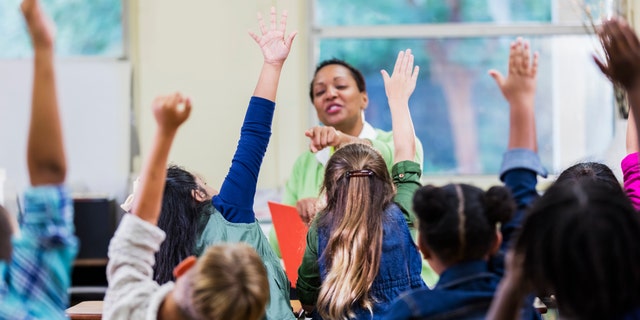Amid coronavirus, is it safe to send children back to school? Experts, parents weigh in

Fox News Flash top headlines for August 7
Fox News Flash top headlines are here. Check out what’s clicking on Foxnews.com.
As the school year looms near, how the novel coronavirus affects children remains a top concern for parents, school officials, and students.
Are children transmitters of COVID-19? Are they susceptible to getting as sick as adults do from the novel coronavirus?
“How easily children can transmit the virus we still don't know," Dr. Roberto Posada, a pediatric infectious disease physician in New York City, told Fox News.
“For other viruses like flu, kids are transmitters, so there is a potential," said Posada, an associate professor in the Divisions of Infectious Diseases and Medical Education in the Jack and Lucy Clark Department of Pediatrics of Mount Sinai Kravis Children's Hospital.
CHILDREN WITH CORONAVIRUS AT LA HOSPITAL DEVELOP RARE INFLAMMATORY CONDITION POSSIBLY LINKED TO COVID-19
Ginny Brooks recently lost her husband, Kevin, a former U.S. Marine, to the virus. She told Fox News that when she recently asked her 15-year-old granddaughter if she wanted to go back to school this fall, the teen had a candid response: “No, I do not want to die."
Parents say they are concerned about students getting sick from COVID-19 and possibly developing Multi-system Inflammatory Syndrome in Children (MIS-C), a rare condition health experts say is linked to the virus.
The Centers for Disease Control and Prevention (CDC) on its website states MIS-C causes multiple organs–including the heart, kidneys, lungs, eyes, skin, and brain, among others–to become inflamed after a child has been infected with COVID-19 or has come into contact with a person who had the virus.

Will children in the classrooms be potential carriers of COVID-19
(Credit:kali9 / iStock)
“It occurs several weeks after the child was exposed to someone who had a coronavirus infection. Typically, the child didn't have symptoms of COVID-19 but does show antibodies when tested," Posada said, reiterating that–albeit rare–the condition is "very scary." He noted, however, that most children who develop MIS-C recover.
The pediatric infectious disease physician said parents should be aware of the signs of MIS-C.
“It usually will present with high fever lasting several days, plus one or more the following: rash, red eyes, cracked or swollen lips, abdominal pain, vomiting or diarrhea," Posada explained.
HOMEMADE CORONAVIRUS FACE MASKS SHOULD BE TWO OR THREE LAYERS TO STOP SPREAD OF VIRUS, STUDY FINDS
But parents who spoke to Fox News said that even if their child doesn’t get sick, they worry they will bring the virus home.
Though there are recent studies investigating children’s susceptibility to the virus and their ability to carry it, there is not a clear answer at this time, Posada said. Until a proven vaccine is found, the infectious disease doctor says precautions need to be followed.
“A major concern with kids going to school is that even if they don't get sick [themselves] if they do get the virus, they can still pass it to parents and grandparents [who] may be at high risk”.
To lessen exposure risk, Posada advised parents to:
- Practice with kids wearing masks so they get comfortable wearing them
- Reinforce the importance of keeping the mask on at school
- Make children immediately wash their hands when returning from school or play
- Continually educate children on proper handwashing hygiene with soap and water for at least 20 seconds
Meanwhile, school districts across the nation are scurrying to implement safety guidelines for children to return to school. School districts such as Nassau County School District in Florida posted new safety procedures online that include so-called "cohorting," where the same small group of students will consistently be together. Other rules included wearing masks, social distancing, and cleaning and disinfecting policies for school buses, classrooms, and cafeterias. Several school districts on Long Island, N.Y., are currently voting on whether children should go to school in shifts – a hybrid type of education – where students attend some days at home and some days at the school to avoid crowded classrooms.
“A tough decision – I feel for parents,” Posada said. "There is a potential risk."
On Friday, New York Gov. Andrew Cuomo announced schools across the state are "authorized to open" for the 2020 school year amid the pandemic.
"Every region is well below our COVID infection limit, therefore all school districts are authorized to open," Cuomo tweeted Friday. "If the infection rate spikes, the guidance will change accordingly. School districts are required to submit plans to NYS for review."

School districts across the state have been submitting plans for reopening to the Cuomo administration for weeks. Those plans will be approved by the New York Board of Health, which has the power to reject the plans, he warned.
There are 749 districts in New York State, some 127 of which have not yet submitted plans for reopening, and 50 are not yet complete, Cuomo said.
Despite the governor's go-ahead, some parents remain conflicted on their stance about returning to the classroom.
“I’m less worried about COVID in schools than I am my kids being affected by this mentally, emotionally, and academically for years," Tara Minson, who has school-aged children, told Fox News.
"I see more parents panicked about kids back in school but yet they are having play dates with other kids?" Minson added.
Meanwhile, other parents said they hope school officials keep to the virtual learning model until a vaccine is found.
“It won’t be fun if they can’t truly be together. The distancing is tough on the little ones and it’s too hard to deal with the requirements consistently," one parent told Fox News.
YOUNG CHILDREN WITH CORONAVIRUS MAY CARRY 10 TO 100 TIMES MORE OF VIRUS THAN ADULTS: STUDY
“I can’t give a recommendation that is applicable for the entire country about children going back to school," said Posada, adding that it "really depends on how the epidemic is playing out at the location in the area and what the local health department determines is appropriate at that region.”
As the nation grapples with back-to-school policies, the infectious disease doctor said parents should make sure they are aware of their child's school's plans and, if concerned, to speak to their family physician about the policies as well as the school district.
Source: Read Full Article


